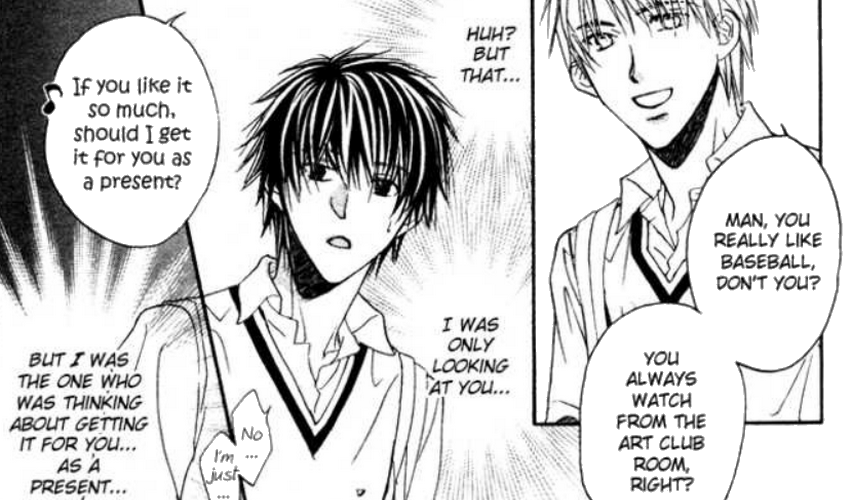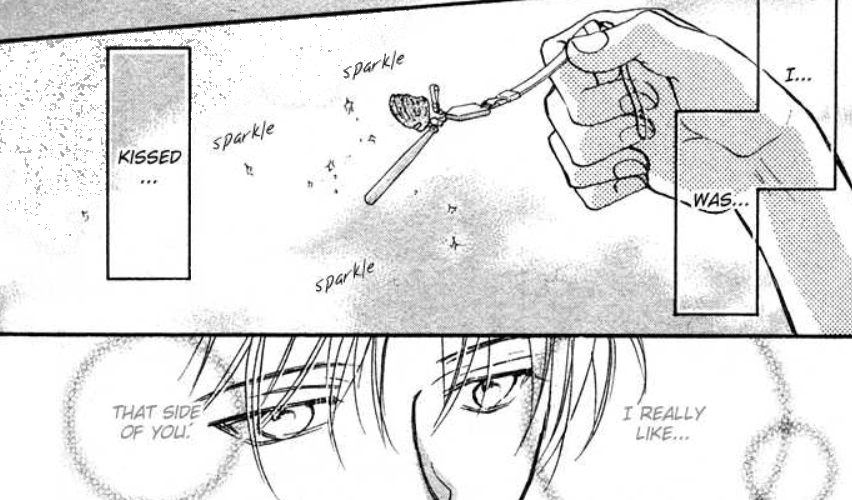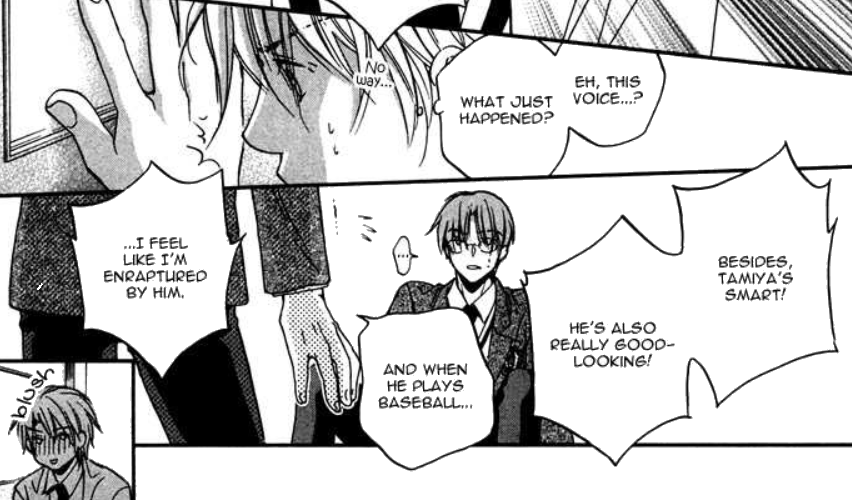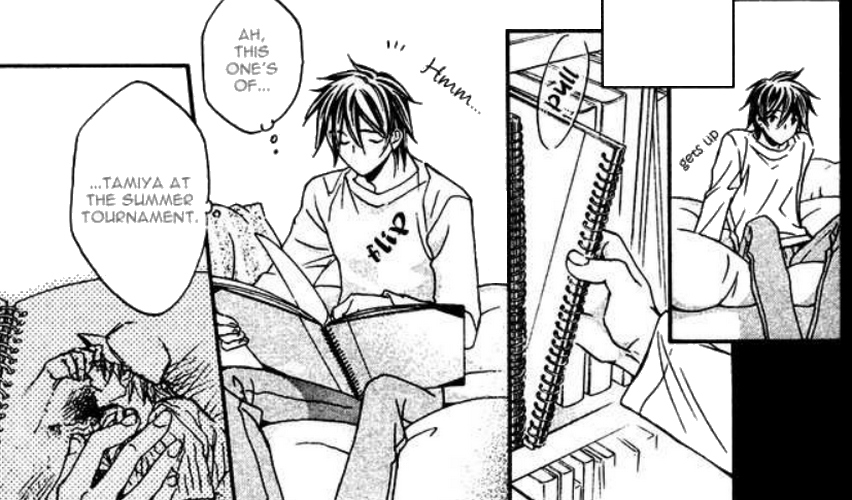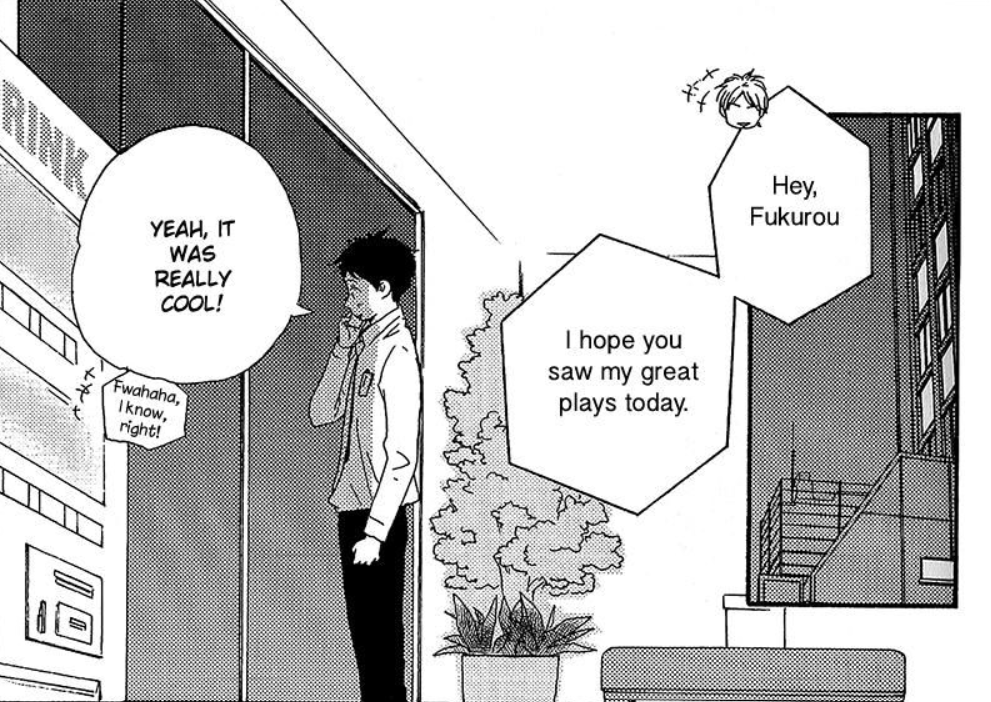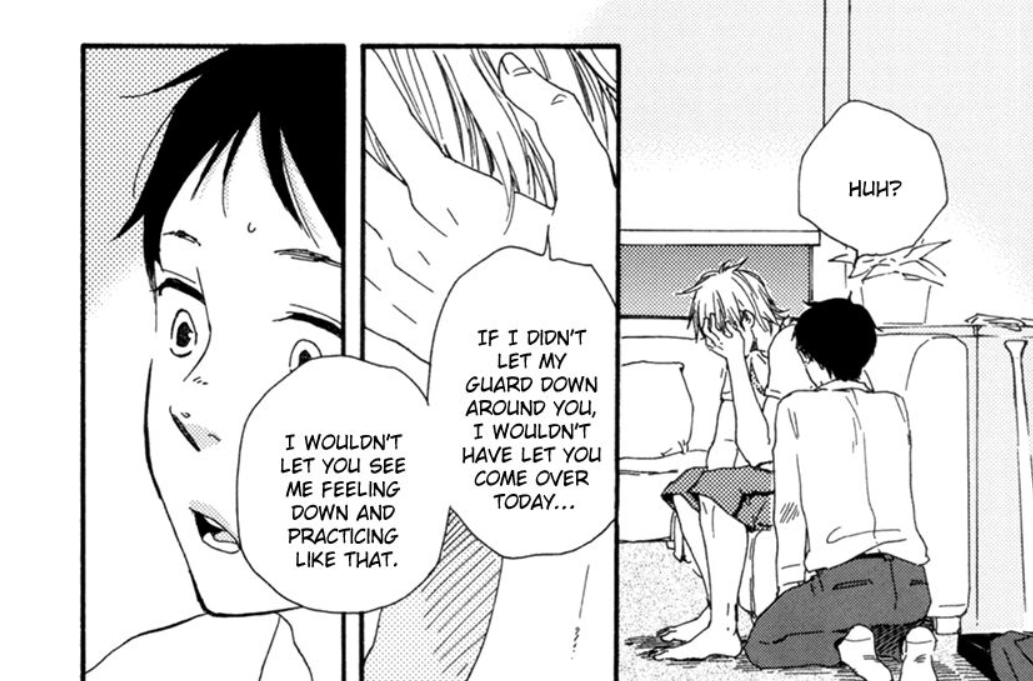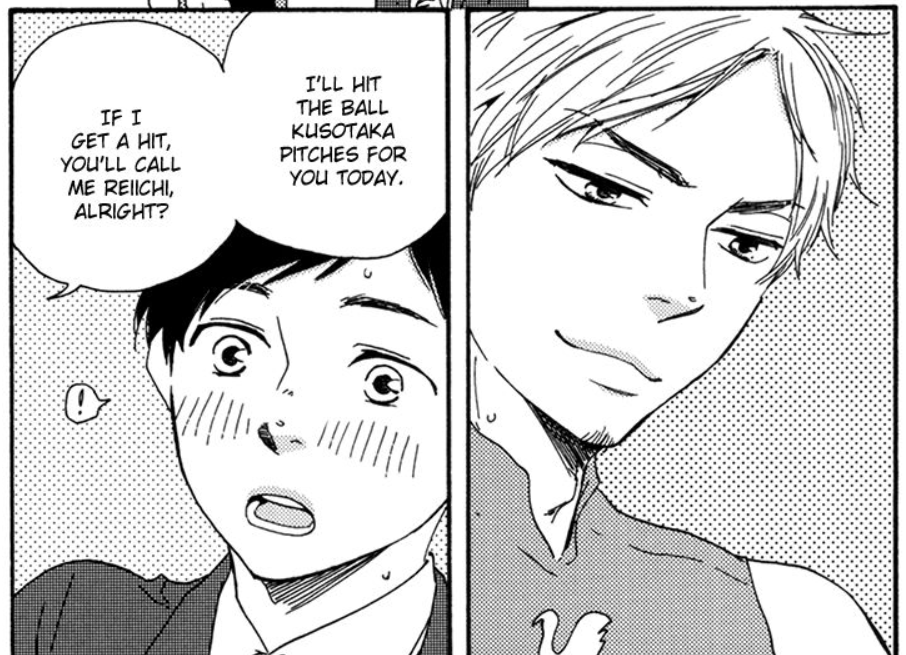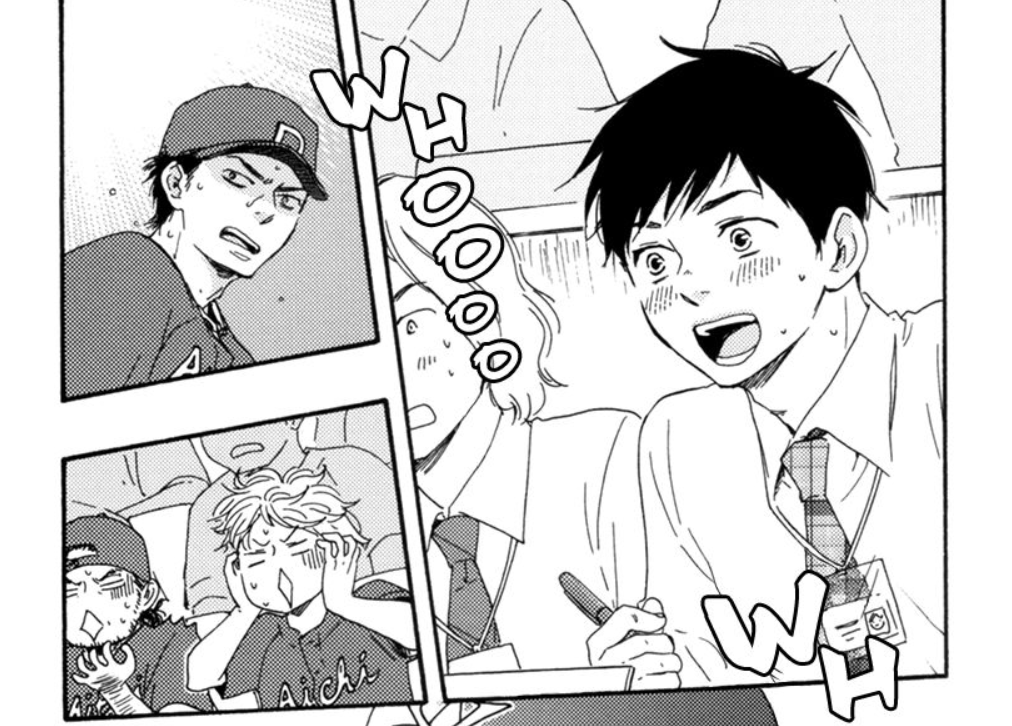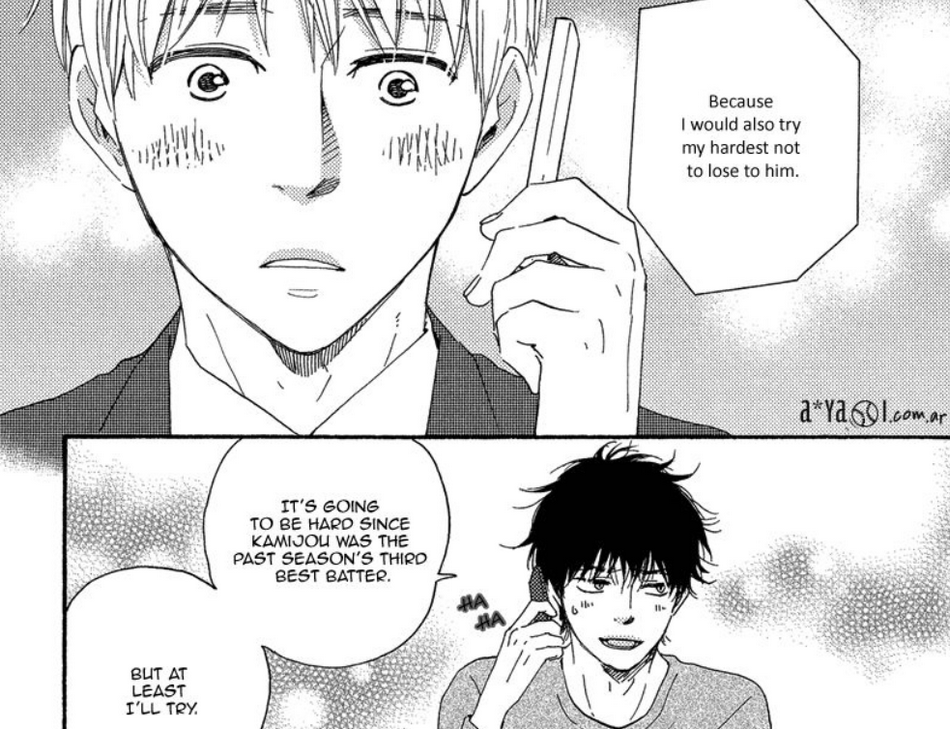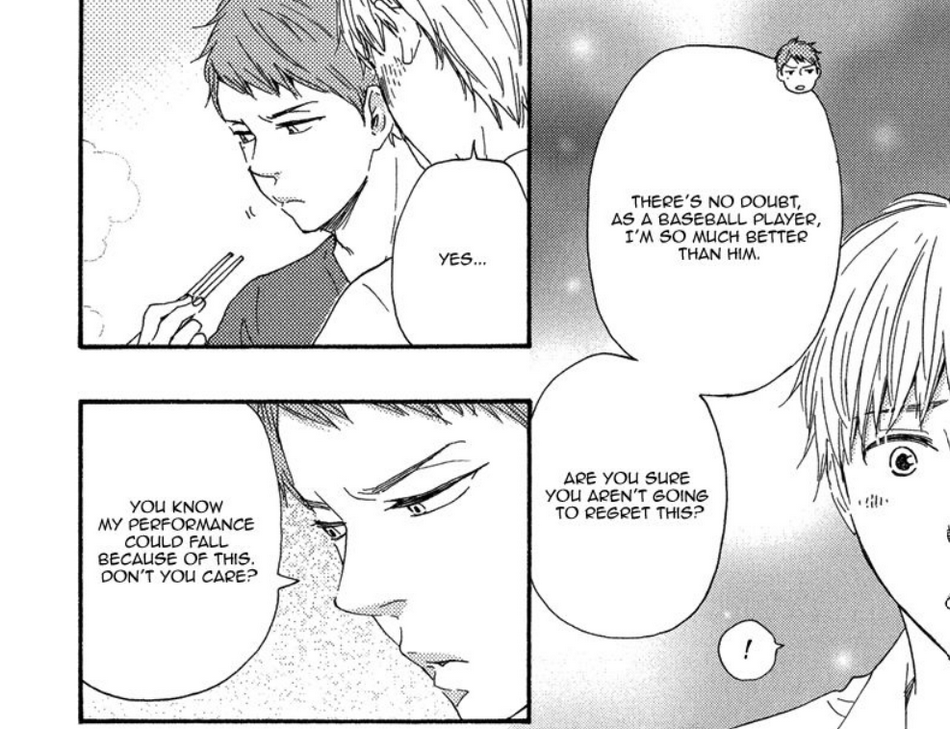Someone Take BaseBall Yaoi Away From Me
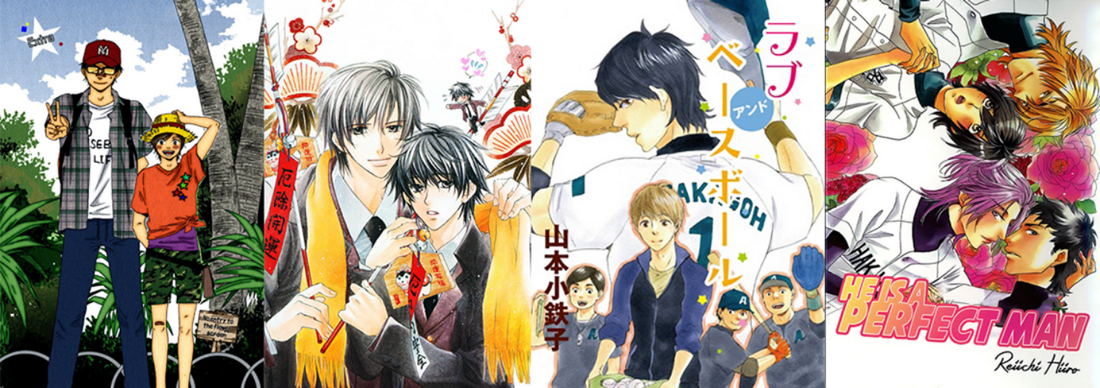
I would ask how y'all are doing, but that's kind of a loaded question now that the Western world is living in pandemic central with no foreseeable way out considering the brute world-dominance of horribly individualistic cultures. Like is the case for a lot of my white-collar peers, I'm entering week two of remote work, so it's been odd to strike a good work-life balance now that I'm in the house most of the time. I'm trying my hand at more frequent posts now that I'm convinced the temptation to blog during work hours is behind me.
So, without further ado, let's stave off the existential dread and urge to guillotine the ruling class by talking about some BL manga. Today we're talking about some baseball manga that I like, which is somehow an amount greater than zero.
Bukiyou na Silent [Awkward Silence]
This one almost didn't make the cut because it's more explicitly a high school love story, but we're including it as entry-level baseball fare anyway. Baka-Updates has validated me by listing baseball as a major category for this title, though, so don't come for me. (¬‿¬)
Awkward Silence is about the budding relationship between high schoolers Toono Satoru, shy and stoic artist bb, and Tamiya Keigo, resident cool boy baseball team hottie. There's a lot of god I wish that were me
feels if you read this as a kiddo in high school because the manga begins with Tamiya confessing to Satoru, who just happens to have had a crush on Tamiya for a long ass time. It's a classic tale of a couple with somewhat mismatched social lives genuinely falling for each other and navigating the drama and misunderstandings that come with that sort of thing and with young love in general.
Click to Open Tangent City ⇊
I'll probably get into this idea more at a later date, but I don't want to talk about Awkward Silence without mentioning the waning appeal of high school romance for me personally. I tried to go back and re-read this a few weeks ago for old time's sake and found myself abandoning it almost immediately. Now that I'm the same age as or even older than a lot of the twenty-somethings in major BLs, it makes me feel increasingly perverse to consume BL with teenage protagonists. I just can't shake the urge to avert my eyes when young people are romantically or sexually experimenting even in fictional works, so it takes me out of it when going back to read shit I was crazy about as a teen. It's not like I relate to their juvenile headspaces anymore and I'd rather not revisit the staggeringly low EQ of adolescents either.
That's not to say I'm not above some high school cosplay… Not age play or anything like that, but stories that plop what are essentially adult characters into a high school setting in a manner akin to Hollywood movies. Nor do I find it as difficult to get down with high school manga that doesn't incorporate the school part too much. For example, I can still tolerate high school stories that focus most—if not all—of their attention on an aspect of high school life that I never lived myself…just like the last manga that I talk about on this list. In these cases, it's easy for me to consume because I don't associate the main plot of the story with my own teen years.
Anyway, I figured I should mention this phenomenon because it's cropped up a lot going through my BL masterlist [link removed as this list undergoes major revision].
There's not an egregious amount of baseball content here per se, but we get a lot of looks into Tamiya's baseball practices and baseball camp things and shit like that. Since this manga is one of the early BL titles I got under my belt, I consider it a baseball yaoi gateway drug. Were it not for Awkward Silence, I don't think I could suspend my disbelief to consider baseball players cool guys whom I should desire from the perspective of the uke character.
In the States, football is king at all stages of life—from elementary school to the NFL—and I don't really recall baseball affording boys and men the same clout as panty-droppers unless we were talking especially attractive men in the literal MLB. At the very least, this was true among working class people from where I come. Sure, guys who play baseball still get girls because they're generally in shape and sporty, but you'd be hard pressed to find guys with girlfriends romanticizing and being super enthusiastic about the baseball part.
However, there's just enough baseball in this manga for me to get it
and be able to see baseball semes existing outside my usual headcanon of baseball players being predominantly a bunch of old guys running around a baseball field… to use the words of my sister's middle school friend newly arrived to the U.S. from Latin America. (Or did he say a bunch of fat guys running around a baseball field
? Oh well, doesn't matter.) As a result, reading this manga inspired me to enter such compelling Google searches as are Japanese baseball players hot?
as a teenager, which makes me laugh in retrospect. The answer, btw, to the search query is:
Yamamoto-sensei's Bibliography
Yamamoto Kotetsuko has been quite prolific when it comes to making baseball yaoi, so I've cheated my way into several of these titles because I love her work so much.
The Baseball Trilogy
![Edited image showing three manga covers for the following titles: Chuchun ga Chun [Vol.1], Fukurou-kun to Kare, and Love and Baseball.](baseball_trilogy.png)
While Fukurou-kun to Kare is more explicitly a sequel to Chuchun ga Chun and Love and Baseball is more of a spin-off, these stories all relate insofar as they exist in the same universe where the semes play major league baseball in Japan: Ootaka Daisuke for the Aichi Dragons, Shiratori Reiichi for the Yokohama Stars, and Sakagou Takuma for the Tokyo Astros. I don't actually give a fuck about baseball, so I'm not going to check if those are baseball teams IRL, but since manga often feature laughably near-identical names to trademarked shit (e.g. WcDonald's), my guess is the above teams have real-world analogs that are very obvious.
Each of these stories is about a different couple with a unique dynamic—although one could argue that Love and Baseball is just an accelerated version of Chuchun ga Chun with different characters—but the overall themes, plotlines, and appeal of the trilogy is the same across the board. Even though I tend to hate this sort of love story, each manga centers around a love triangle and explores themes of infidelity. Still, I love them and I chalk that up to the series being a good example of BLs that are deeply invested in teasing or making fun of men, which is my favorite activity on earth as a kinda domme bitch.
Click to Hitch Another Ride to Tangent City ⇊
I think my return to BL has gone so smoothly because the trajectory of the genre has reflected my own changing attitudes toward sex, romance, and male desire as I've grown up. From my favorite piece of BL scholarship:
These days, no matter how I think about it, I get the feeling that many male heroes don't represent theshōjo's alter ego.… [I]n many cases authors choose to model their characters onreal men.(I sense this tendency in works featuring salarymen or middle-aged men…) Of course, there are many works that deal withthe shōjo's inner self,but just as women's observations of men are undoubtedly becoming more astute, the otherness of male protagonists is also becoming more pronounced.
Fujimoto Yukari,The Evolution of BL as ‘Playing with Gender’
Verisimilitude of male representation both in terms of physical appearance and personality is something I seek out more often in my BL as I move away from imagining myself as uke in these scenarios to simply observing two characters (whose bodies I desire as a heteroflexible woman) navigate interpersonal relationships and do sexy shit. Why I mention that here is because the primary appeal of the baseball trilogy for me is the fact that it zeros in on a specific male archetype, aka the popular athlete alpha male, and uses comedic BL to mock their stupid ass behavior.
Women of all flavors are used to dealing with this kind of dude, so we have a lot of lived experience from which to paint an accurate (if exaggerated) picture of them and really explore the shit we hate the most about them, all the while acknowledging that each of these sporty alpha types can be uniquely bad as an individual. He could be closed off, egocentric, overly competitive, unfaithful, unappreciative, or all these things at once. Plus, at the end of the day, it's still affirming that these guys are desirable partners for a variety of reasons. All the trilogy is saying is that this is just some of the fuck shit you might have to put up with if you end up saddled with one of these guys as your partner. They're still hot and capable of sharing a genuine bond with you if you're willing to withstand the fuckery.
Chuchun ga Chun [Tweeting Love Birds]
Fans of Yamamoto Kotetsuko know that there's two things in the world she really loves: birds and baseball. In the first of the trilogy, her two interests collide—at least to some degree.
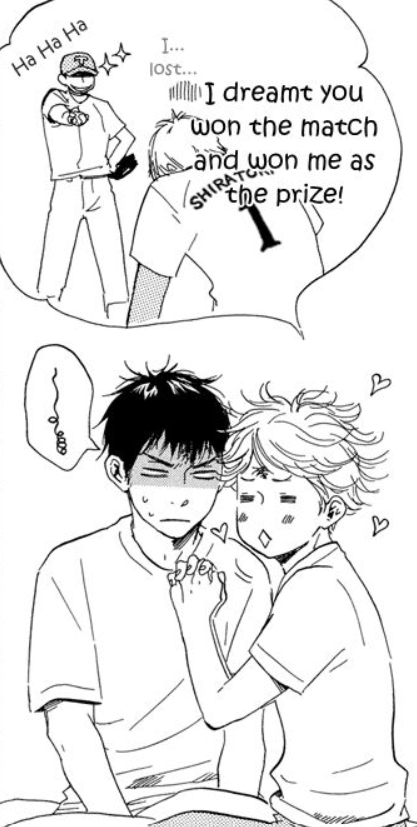
This one follows the slow-burning love story between college baseball teammates Ootaka Daisuke, freshman, and Morino Suzume, third-year captain. Suzume means sparrow in Japanese, so everyone calls him Chun
(the sparrow's Japanese onomatopoeia), and Ootaka's name has something to do with eagles. If I'm being real, the age difference does make me somewhat unhappy—an 18 and a 21 year-old is a bit dicey to me in the context of undergrad life now that I've lived it—but we've gotta work past it. (Are Japanese undergrads roughly the same ages as North American collegiate lames? Someone let me know.)
Just like the remaining titles in this post, Chuchun ga Chun connects a lot of interpersonal stuff with the literal act of playing baseball, i.e. game of love
analogies abound. These subtextual comparisons of love rivalry and sports rivalry become explicit when Shiratori Reiichi, who claims to be Chun's fiance, challenges Ootaka to strike him out—Taka is a pitcher—in exchange for Chun's hand in marriage or something. I think he technically agrees to give up on Chun if he strikes out, since it seems like the engagement
is a pretty one-sided affair anyway.
So whatever, right? Not too fast. The sinker is that Shiratori Reiichi is a god tier batter in actual professional baseball… So it is kind of a lot to ask of a collegiate-level pitcher, especially one who attends a school whose baseball team has notoriously been taking the L for a minute. Since it's a comedy, though, things turn out fine after Taka trains his little heart out. The narrative concludes with Taka being drafted for the Aichi Dragons his senior year.
Chuchun ga Chun is one step above Awkward Silence in terms of being bonafide baseball BL, as in it's more of an undergrad student life story with a lot of baseball stuff thrown in there. Yamamoto-sensei actually talks at the end about how she wished she could have incorporated more sports footage in the story, but she more than makes up for that with the sequels.
This manga is my least favorite of the trilogy because it burns just a tad too slow, the cock-blocking was really avoidable and dumb, and I don't like leaning into the spoils of war trope conceptually. However, I do like the question that it poses: besides having sex, how else does love manifest physically? I wouldn't say that it's sweet pool deep, but I was still very:
Fukurou-kun to Kare [Fukurou-kun and His Boyfriend]
My absolute fucking fav of the trilogy, which is astounding for reasons we'll get into in a second. In comparison to Awkward Silence and Chuchun ga Chun, this manga is aggressively about baseball, thanks in part to our two protagonists. Fukurou-kun is a sports reporter for a popular TV station, so it kind of goes without saying that he likes baseball or he wouldn't have made a career out of talking about it. In this one, baseball all-star fuckboy Shiratori Reiichi gets upgraded from side villain to top billing as Fukurou's boyfriend.
From the prequel, we know that Shiratori is obsessed with baseball because it seems like the only thing he has going for him, unlike Taka who is steadfast and hard-working on top of being good at baseball, even if he's a little closed off and unexpressive. Yamamoto-sensei's notes after this story ends are truly chefs kiss because she says what we're all thinking:
Even I don't know why I like Shiratori so much. Is it because he's the complete opposite of me? There's nothing about him I can sympathize with (laughs).
And she's right. He still sucks ass and hasn't learned a damn thing since Chun left
him for Taka. (Again, were they ever even really together?) He's egotistical, lecherous, rude, confrontational, has douchey facial hair, and is a fucking cheater! He cheats on Fukurou, who I would marry fucking tomorrow if he was real, and Shiratori can't even be loyal!!! But rather than a Porno Superstar situation where I tolerate an outrageous seme out of my love for the uke, I actually like Shiratori. Why? How?
In Chuchun ga Chun, the challenge Shiratori issues Taka makes us all go hah?
because it's so fucking juvenile, but we learn that basically all he ever thinks about is baseball, so winning Chun in a baseball battle was like the depths of his emotional reserves probably. Throughout this manga, he is always looking for validation about his performance in baseball games from Fukurou, shows vulnerability to Fukurou by being upset about his baseball performance, and manages to finally hit Taka's pitch despite Chun's presence in the final romantic beat (see carousel above). Baseball is quite literally his emotional center.
The fact that Shiratori could never hit Taka's pitches before is because his love life and baseball life were out of sync. When he finally finds the person who he's meant for and therefore has a positive place to direct his showboating energy (impressing his lover) everything clicks. Conversely, the reason that Taka was always able to pitch like a god with Chun around is because their love was synced up and perf. Shiratori's success against Taka doesn't mean that Taka and Chun are no longer synced up, either, it's more that Shiratori has the energy of newlywed bliss behind him in a way that our original couple does not.
Our two heroes are just perfectly suited for each other, too. Their gut instinct is to be very bickering and openly annoyed at each other but I think it's good how they can be insanely honest with one another almost from the get go?? Like there's infidelity and communication problems, but as soon as one becomes truly aware of some shit they don't like, they gripe about it right away—now that's some #relationshipgoals. I love that scene where they're trying to have a serious conversation about what they like about each other and all Shiratori can say is their sexual compatibility and all Fukurou can say is that Shiratori is cool. Damn, guys, that's deep. Fukurou-kun is also a major bad bitch, btw, and negotiates Shiratori into a monogamous relationship by the end of the manga.
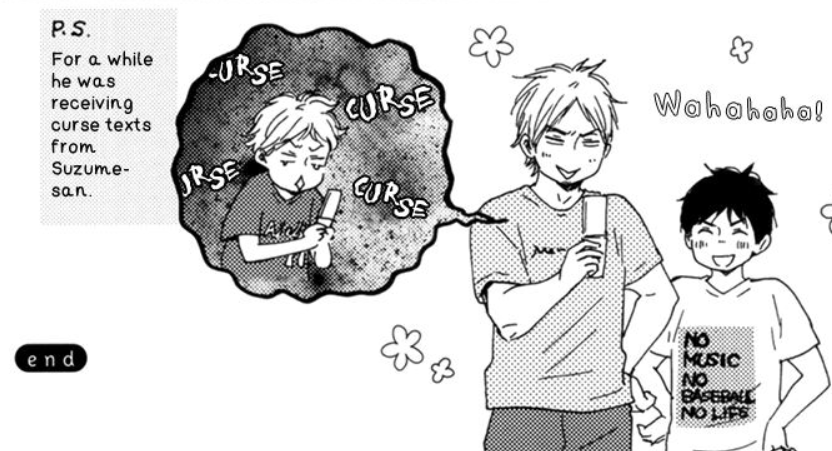
I'm including this last pic because it's the best. It shows how the very macho sports competitive thing extends to the entire couple, so it's openly TakaxChun vs. ShiratorixFukurou… I just love when ukes are included in masculine posturing bullshit because they're still men at the end of the day! I get very My Wife's Enemies Are My Enemies, Too
vibes from this last panel.
Love and Baseball
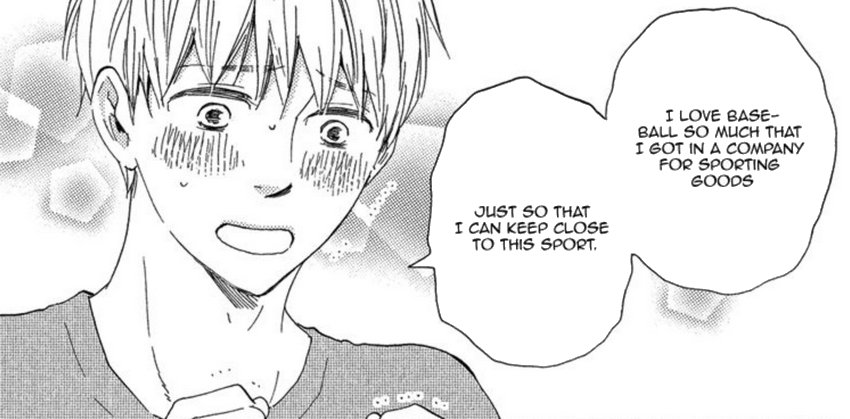
This manga tells the story of recently-injured Tokyo Astros player Sakagou Takuma and sports facility manager guy (irdk) Miyata Kokoro, who works at the second string Astros training camp where Takuma is convalescing. There's not a lot of girlies to fool around with wherever this training camp is located, so Takuma starts fixating on Kokoro because he's pretty despite being a dude.
Too bad for Takuma, but Kokoro has a boyfriend that's nearly an exact copy of Shiratori Reiichi but also somehow worse—he's unfaithful, full of himself, and plays for the Yokohama Stars. But whereas Shiratori cock-blocks Chun and acts childish at the idea of him dating someone else, Kamijou Hitoki (the boyfriend) is incredibly controlling of Kokoro, knowingly manipulating him into staying in the relationship even though they both know it hasn't been good for Kokoro for a long time.
Like I said before, this manga can kind of be described as an accelerated version of Chun and Taka's story with different characters. This change of pace is altogether way better, but I think there are other reasons why Love and Baseball comes in hot at the number two spot for me. First off, Takuma is the hottest seme of the three—he's got more of an Endo look about him—and he's a happy medium between golden boy Taka and horrible boyfriend Shiratori. Takuma can be jealous and petty, but knows how to rein himself in most of the time. He's very competitive about both love and baseball, always going on about how he won't lose
to Kamijou, etc. He just can't help but bring baseball and being relatively better at baseball into the equation when he's trying to have a heartfelt conversation about being in love… just like the lot of 'em:
What's cool about Takuma, though, is he can put the baseball shit aside when it really matters. Unlike when he's talking to Kokoro about Kamijou, what he says when he first realizes that Kamijou is his love rival is that he's a better man—full stop:
Damn it… I'll be fine! I shouldn't let this depress me! And it just had to be Kamijou of all people. I'm a way better man than him. Damn it! Damn it!
The fact that he's good for Kokoro comes down to his character and has nothing to do with the baseball… a refreshing take for this trilogy.
Lucky Number 13
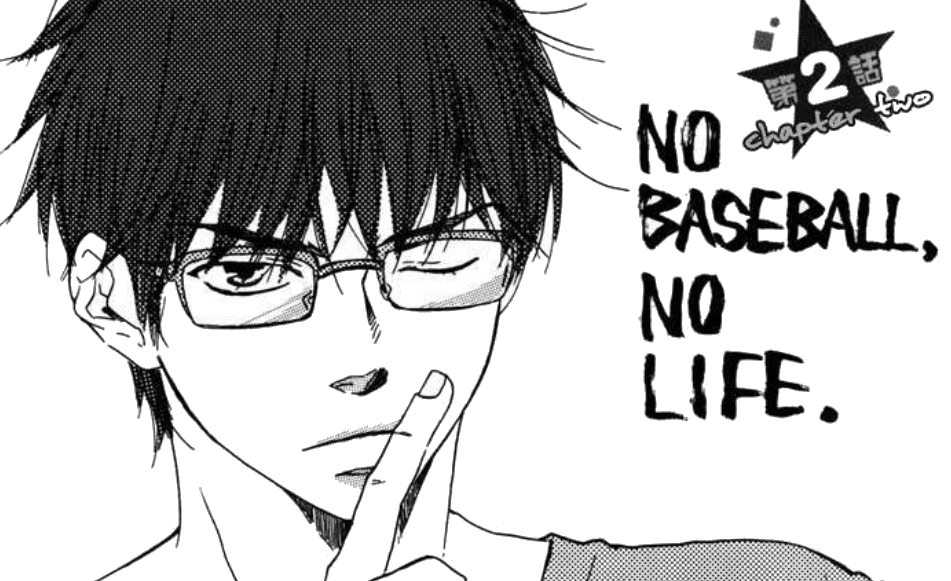
This title is here as an honorable mention. It's also by Yamamoto-sensei, but is a love story between a baseball otaku, Tsumabuki Kasumi, and a really unlucky guy, Satou Hiroshi, instead of actual baseball players. I'm always charmed by Lucky Number 13 when I go to read it because Yamamoto-sensei flexes her knowledge of baseball and baseball history through Tsumabuki the whole time.
There's a love triangle in here somewhere, which is less tolerable considering that there's no larger on-going competition between all the male characters through actual baseball games behind the scenes. I guess anything with sports lends itself to a competition of love concept pretty easily, so no hard feelings… but I still hate it.
The eventual failure of the third wheel to snatch up our seme Tsumabuki is interestingly an inverse of the implied message of the baseball trilogy, which is that love can really thrive when a couple has shared interests. Instead, Luckily Number 13 reminds us that our unique bonds with that special someone don't need the trappings of shared interests to be good. What really matters is respecting your partner and their interests, and not expecting them to mold themselves to being a carbon copy of yourself. Cute stuff!
Perfect XXX
We finally made it to the fucking king of baseball BLs… although its title suggests something way more hardcore lol. Perfect XXX covers the lifelong romance between second year high school students Kariya Kenshiro and Sasami Ayato, aka Aya-chan.
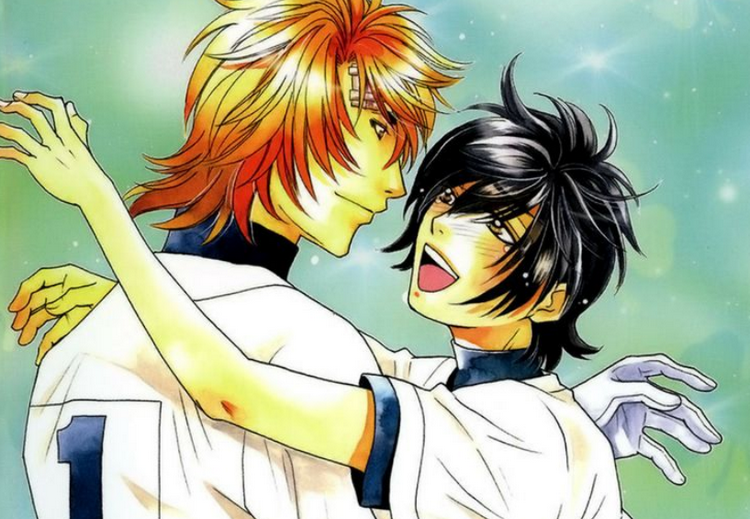
Dirty baseball jokes about gay guys have shockingly not come up yet, since up to this point the only story in which both halves of a couple actively play baseball casts them as twin pitchers… that's Chuchun ga Chun for those who haven't read these texts. Our main couple in Perfect XXX bears the brunt of the age-old question who's pitching and who's catching?
since Kenshiro (seme) is a god tier pitcher who refuses to play unless Ayato (uke) acts as his catcher. The auxiliary couples are for the most part spared this same *chuckle chuckle* dynamic, so it's a joke I'm actually willing to abide.
Let me tell y'all, if this BL were any more about baseball, it wouldn't even be a BL anymore. If you cut out all the butt sex, you could realistically market this story to little boys. I like to think of it as a 2-in-1 shampoo and conditioner kinda deal for perverted weebs, since it's as though a sports manga was weirdly published along with its BL doujinshi to make things easier for all of us. Unlike even the baseball trilogy, which still reads predominantly as BL romance that happens to have a lot of baseball stuff going on, Perfect XXX couples are exclusively baseball players dead set on doing The Most™ over some baseball, which for Japanese high schoolers means going to Koshien and getting that purple flag of victory. (I think the flag in the color illustrations is red, though?)
Although all of the characters in this manga are ostensibly high schoolers—the semes all look like grown ass men in typical BL fashion—the fact that the narrative center of this manga is a sports competition is the main thing that doesn't take me out of it. In many ways, it's easy to forget that these characters are literal teens until they're on some immature bullshit. I didn't play sports as a kiddo and my only frame of reference for sports competitions is, like, Hank Hill going to state and Bring It On cheer nationals, both of which are not real even if they allude to IRL shit. Case and point: it's easy for me to ignore the high school angle here somehow.
At any rate, my relationship to the baseball in this story is a bit different because when I took up BL again and saw that this manga had finally been translated in full, I legit fast-forwarded through the sex scenes just to get to chapters with the baseball games. I mean, I was fucking riveted by the gameplay and desperate to see if our boys make it to the finals.
Hiiro-sensei does a fantastic job of integrating all of that good interpersonal stuff directly with baseball; instead of using good gameplay as an analog to a happy love life, the deep understanding and love that the couples in this story develop for each other is immediately reflected in baseball games, where the implicit knowledge of their partners' actions and normal demeanor has major effects on the success or failure of a given game. Oftentimes, temporary inability to have faith in themselves and/or the bond they share with their partners is what makes a game go badly.
The interlinkage of interpersonal stuff and baseball is carried all the way through to the end, when our heroes win at Koshien—whoo!!! Omg, I was so happy. As Ayato holds the purple flag of victory, he reflects on the fact that it symbolizes more than their baseball victory—it's a physical representation of the new experiences, friendships, and deepening romantic bonds that they encountered on the way to their end goal:
The summer of my second year of high school, I won the purple flag of victory, filled with the feelings of all the players we met and confronted, but also... the best of boyfriends.
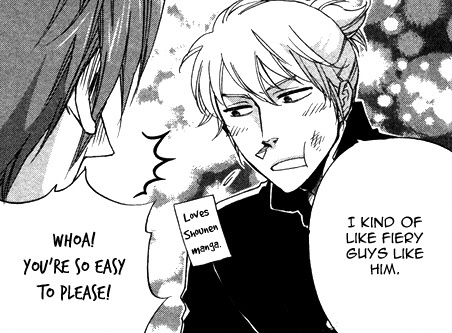
What can I say, though, I was a girl raised on shounen anime, so deep down I love really fiery guys with a very specific end goal that involves physical activity and rivals with whom they're so intense homoerotic undertones are literally unavoidable. It's worth mentioning again that Perfect XXX feels like sports shounen that's been published with its BL doujinshi for fandom convenience.
This manga is also good content for BL fans who like pretty boys, but still like to see them characterized as having traditionally masculine traits. By far the prettiest guy in the whole manga, pitching ace Kamui Nijihiko, is repeatedly talked about as being terrifying in the face of his enemies
and they're really not joking about that. Uh, it's just too good all around!
Hiiro-sensei's Double Call is about professional baseball, but I haven't read it and I have no real interest in doing so unless someone tells me it's really good. I am completely convinced it would just make me want to go back and read Perfect XXX for the umpteenth time.
Back to Homeplate
So, what have we learned today? I will read BL about anything if there's complicated interpersonal stuff going on in the background. Before I could brag about being in the BL game for a decade, my claim to fame among my fujoshi friends was that I had read all kinds of niche ass BL. A modified rule 34 was applied to me: if it exists, then Shio has read a BL about it. The fact that I can even name a handful of different baseball stories from three different artists is a testament to that. I salute your dedication to narrative diversity, old self! I may make a series out of this sort of thing to honor all the strange, out of character plot lines I've tolerated (or even come to low-key love) for the sake of some man-on-man action over the years. Baseball isn't crazy niche, but I promise I have way niche-ier up my sleeve.
Be sure to tell me if I've offended you by leaving off your favorite baseball yaoi from this list, not that I give a shit if you're actually mad. Lmk what they are and I might try them out so long as it's not Double Call or about even more high schoolers.
On a sadder note, this brief foray into baseball yaoi hasn't really met my requirement of being a shorter
post, even if it was still way faster to write than my deep dive reviews. You may see experimentation with different post types over the next few weeks as I try to find something more short and sweet for y'all to read. For now, we'll just say I'm writing term-paper length posts to help fujoshi bored outta their minds in quarantine.
Post History and Author's Notes
This review was originally posted to WordPress under the Reviews
category on March 28, 2020. Post content was converted from its original format and made viewable for Neocities on October 30, 2022. Minor grammatical changes have been made to the post text and two images have been removed in favor of a more appropriate blockquote element. Page favicon is from Icons 8.
This page tries to make use of a JavaScript carousel, but barely succeeds. I'll be back to work on it periodically. For now, just manually scroll through the images when necessary; I've kept a horizontal scrollbar for this purpose in case you can't see it (idk if you use those really thin scrollbar settings or are on mobile).
Last updated: 2022-11-06
